The outbreak, endemic and pandemic have been threatening the world from Plague in 1720 to Coronavirus in 2020. A century has passed but answers have always been found. Corona Virus Disease 2019 (COVID-19) is not just a global health hazard, its impacts are multi-fold.
It has socio-economic consequences, socio-political detriment, security challenges, global diplomacy provisions and reservations, crisis management dilemma. Nepalese are keenly watching the political parties, the politician and tools and instruments of the government for their leadership, supervision, direction and performance.
In this unprecedented time, Nepal progressed with a formation of the COVID-19 Crisis Management Center (CCMC) under the Minister of Defense signaling that the Army’s participation is inevitable.
It initiated with containment and later mitigation enforcing social distancing closing schools, shops, cinemas, banning public events, even shutting down mass transit systems. As public health network is not resourceful the need for temporary infrastructure was a necessity for the suspected and infected.
This would also be an opportunity for understanding for future arrangements of political entities for emergencies. A potential war has to be fought with political unity that requires all-party trust and cohesion.
A strategic organization with organizations till district levels existed with the budget; the Health Emergency Operation Center (HEOC) under the MOHP and National Emergency Center (NEOC) under the MOHA.
Though the local political entities emphasized the first responder by the government, a strategic central body with political and strategist should have been established with an operational mechanism at the Provincial level to provide operational guidance to the local political bodies.
This would stress the political bodies being accountable to the people for controlling, preventing and treating the disease. The local body should take the government tools at the local level to their advantage. Winning the battle at the local level is a strategic success for the central.
This would also be an opportunity for understanding for future arrangements of political entities for emergencies. A potential war has to be fought with political unity that requires all-party trust and cohesion.
The National Security Council (NSC) should be activated to bring all the government’s machinery on board for now and future dimensions as life and the country will never be the same again.
The military of nation-states deploy on the managing crisis but the constitutional and legal procedures vary. Communist China made the most of the People’s Liberation Army that won the COVID-19 fight in Wuhan. The risks and sacrifice has been well documented by the media and has political interests.
The US is using all the capabilities of the military and mobilizing the reserves even replacing the civil police. Likewise, because of the limitation, the Nepalese Army should be deployed to be employed on a necessity basis and act as a strategic reserve at the center, operational reserve in the Province with the occupied contribution in the districts.
Testing and identifying the virus connotes to multiplying health practitioners. The Army could initiate adopting the concept of train to train the trainees. The government’s decision to ask the military to purchase emergency medical instruments considered necessary for addressing the crisis drew criticism in all sections leading to arguments; when the civilian authority is capable and political leadership determined.
Political decisions are dragging the Army to controversy at the same time the Army has not been able to portray its position. The argument is good and efficient governance as well as an anti-corruption drive, which will certainly derive from political will, the Commission for the Investigation of Abuse of Authority (CIAA) and other body’s non-hesitance to bring to book the corrupt.
The worst scenario is a prolonged lockdown in India which will have a global impact but Nepal with seriousness and impel the country’s economy and resources into pessimism. Slow down of remittances and return of a large number of migrant workers will add to the Diaspora.
The days ahead will get worse modestly by the virus but the impact of the pandemic. The rise in unemployment and shortages of essentials will occur to many sectors but the poor and the daily waged will be short of food and shelter questioning political trust deficit and failure of the government.
Telling the story of hope and countering the force that divides through different means is required. The government should look into immediate measures and impacts with short and long term consequences and measures needed to be adopted.
Opening the lockdown has both risks and opportunities for success handling. With the administrative arrangements that the country has the opening should be on the decisions of the local political entity like the municipality in coordination and cooperation with district administration. An example could be Wuhan opening up after 76 days of constant aggressive mechanism.
After PM Oli’s conversation with PM Modi, the intent of the Head of the Government should be followed by the Ministry of Foreign Affairs and approach India to work together to stop nonessential travels, trade, strictness in people’s and illegal movement and most important secure basic prerequisite supply.
The days ahead will get worse modestly by the virus but the impact of the pandemic. The rise in unemployment and shortages of essentials will occur to many sectors but the poor and the daily waged will be short of food and shelter questioning political trust deficit and failure of the government.
The public funds allocated to the parliamentary members should be returned to the public but their respective Local political bodies. Five factors that are impacting the efficiency of the management are the Nepal Communist Party’s internal political dynamics and leaders’ aspiration, lack of strategic coordination and cooperation, intra-ministry rivalry, the establishment of CCMC when the country already had structured HEOC and NEOC and finally motives of corruption.
For operational success, three concerns have emerged while managing the crisis one, the requirement of a dedicated Border Security Force which was so well discussed and was visible during the Kalapani border encroachment episode.
The migrant workers returning from India and the handling at Nepal-India border was a catastrophe. The other is management and handling of national crisis, which the nation has experienced during the 2015 April devastating earthquake Operation “Sankat Mochan”.
An important caveat in the first order of business for all involved in administering and performing during the crisis to be able to maintain own health and institutional capability.
The NSC, CCMC, HEOC, and NEOC should ensure strong national security and contribute in medical research and development, logistics and critical infrastructure, support to population drive through testing, law enforcement and control of civil populations, information operations while fighting a ‘pandemic’, but together with it an ‘infodemic’.
The outburst of Coronavirus pandemic is conceived alarming with uncertain surroundings, a key emerging front as a third global conflict.
The world’s common enemy is a virus, but our enemy is also a growing surge of misinformation as the first enemy. So to overcome this virus, we need to urgently promote facts, science and solidarity over despair and division.
Sixth is interagency cooperation, border management and control now is a test and trial. Law Enforcement and Intelligence Forces of both Nepal-India should take this as an opening to learn for best practices. There are currently at least 47 vaccine programs underway, according to a list kept by the Milken Institute.
COVID-19 pandemic has public health, socio-economy, socio-political and geopolitical ramification, and numerous consequences depend on how long the world will be on the edge.
Will the state of the world alter? The state of affairs can be in three forms: Prior Coronavirus, relative capabilities post Coronavirus and third, alliance levels and alteration may be converted into inclusion and then put to the empirical test in the years to come with China and the US shaping the future.
Although there has been no major combat between the great powers since World War-II, wars are anticipated in a smart form. The outburst of Coronavirus pandemic is conceived alarming with uncertain surroundings, a key emerging front as a third global conflict. War of the 21st century that will bear impact in diplomacy, national security, economy, population, instruments as well as sources of power.
As COVID-19 continues to spread, we are analyzing all aspects of the virus from the science of the pandemic to its political, economic and social consequences with rigorous domestic and a global perspective. Albert Einstein said “Amid every crisis, lies great opportunity” so this is a war we are fighting and we have to together win and learn.
Basnyat is a Nepal Army Major General (Retd.) and a Security Analyst.
(Views expressed in this article are the author’s own and do not necessarily reflect Khabarhub’s editorial stance).


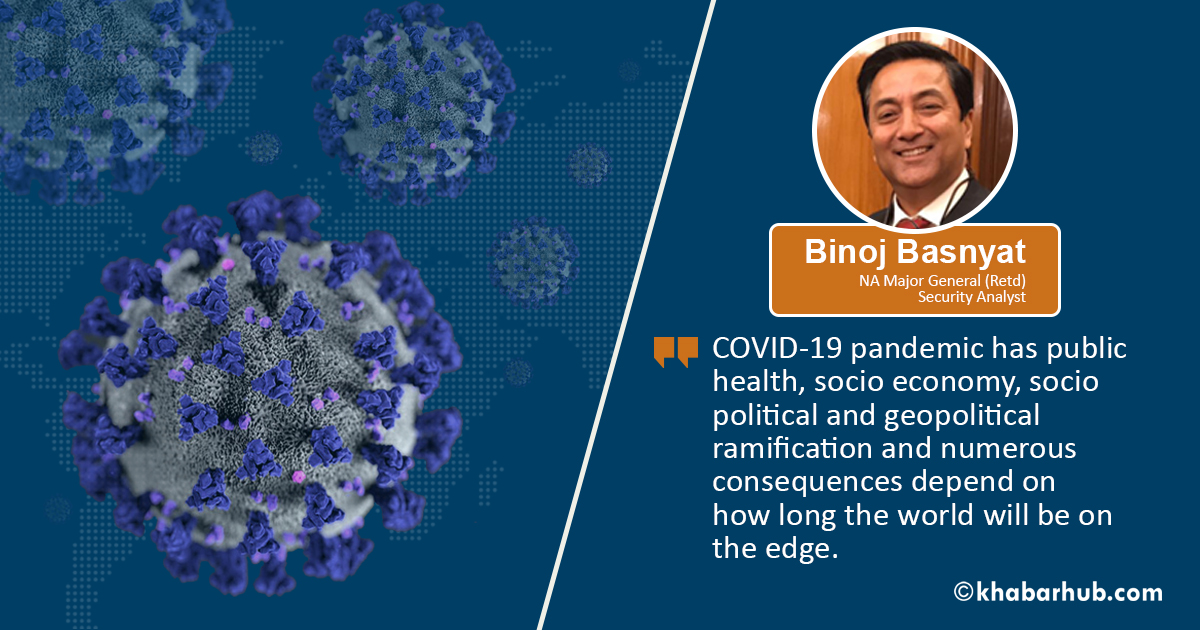
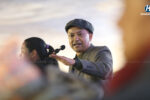
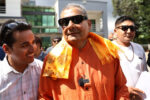
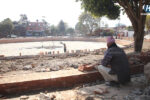
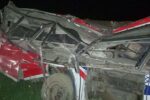


Comment